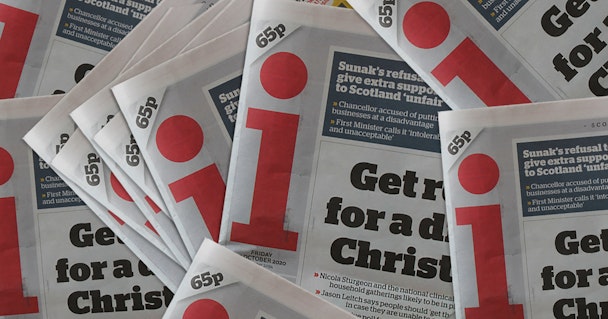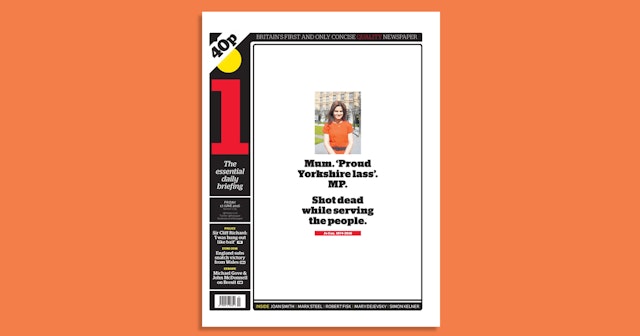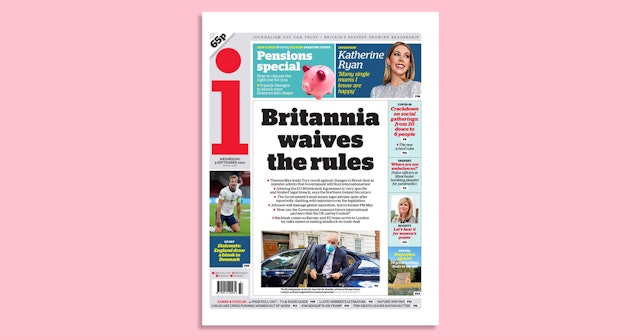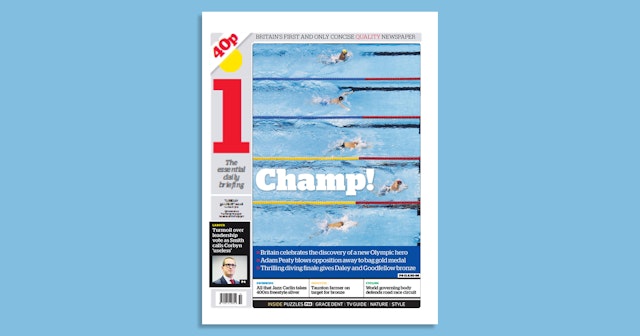
Advertisement

The i newspaper
As The i celebrates a decade on the newsstand, we catch up with editor-in-chief Oliver Duff and reflect on the paper's evolution from tabloid spin-off to media success story.
When The i newspaper launched 10 years ago this week, people thought its editors had lost their minds. A new print newspaper, hitting newsstands in the midst of the biggest recession in living memory?
Richard Desmond, the owner of The Daily Express, reportedly told its owners: “You must be fucking joking. What do you think you are doing?”
Intended to provide a concise, smart newspaper for the intelligent commuter, The i hoped to build on The Independent’s platform. But critics thought it was on a hiding to nothing – that busy commuters would never buy a paper rather than look at their smartphones and that a new title launched into a declining print market, in the jaws of a recession, was destined for train station recycling bins.
Marketing commentator Mark Ritson even wrote of the launch that the single letter in The i’s masthead would stand “for irrelevant, ill-conceived, and ultimately, ill-fated”.
Yet 10 years on, the paper is still on newsagent shelves. The decade has been an eventful one, not least for Oliver Duff, its editor-in-chief.
“My day starts slightly later. 10 years ago as head of news, I’d be heading into the office by 6.30 in the morning,” he says. “But I do get a lot less sleep – we’ve two young kids aged four and one, and the younger one woke me up at 5am today.”
Much of Duff’s adult life has revolved around The i. He started at its parent, The Independent, as a reporter in 2004 and met his wife (herself a journalist) while working for ESI. He worked on The i at its inception, as The Independent’s then-news editor, and later served as executive editor before taking on the mantle of former editor-in-chief Stefano Hatfield in 2013.
The paper launched in pessimistic times for the quality press. The fortunes of The Times and the Financial Times hadn’t yet turned around, while Duff recalls that “The Guardian still hadn’t faced up to reality about its massive losses”.
While The i made an initial splash, sales soon cooled on the newsstand. The brainchild of editor-in-chief Simon Kelner and managing director Andrew Mullins, the paper debuted in a rainy winter – and sales slumped to 35,000. Despite warning signs, the strength of feeling from early readers gave the team the belief to continue. “We’d had such strong feedback from the readers who were buying it. That gave us the confidence, and gave the owners the confidence, to stage a marketing campaign in the new year.”
With a proper promotional push in early 2011, sales soon began to climb to over 130,000 in January and over 160,000 a month later according to the Audit Bureau of Circulations (ABC). “There’s life in the old print dog yet,” remarked a cautious Peter Preston in The Guardian. Mullins claimed the turnaround as a minor miracle, saying: “The fact that we have been able to grow the print category without cannibalising The Independent also clearly demonstrates that there is a significant untapped market for time-poor consumers who want to read a concise, quality newspaper.”
From 2016 onwards, when The i was bought by JPI Media, the paper has gone from being “a production job” that scaled down The Independent’s journalism to a quality concern that sells itself, Duff says, on “strong original reporting and spiky opinion”.

A decade later, he credits The i’s dialogue with its readers – firmly established by smart moves like putting reader comments on page three, rather than hived off in the back pages – as one of its most valuable assets. Notably, The i runs a daily letter from the editor-in-chief to readers rather than a faceless ’leader’ column. And while the paper’s offer to readers has evolved, “the same principles are there in a package and an approach that our readers really like”.
Duff’s framework neatly fits into five pillars: quality (“It’s got to be worth paying for”), conciseness (“We read everything so you don't have to”), value (“We value your time and your money”), fairness, and its relationship with readers.
The system appears to work. According to PAMco, The i has a daily readership of 835,000, including both print and mobile readers. Inews.co.uk now receives over 10 million unique visitors a month, hitting a peak of 18.5 million back in April (according to Google Analytics); and the paper has a 20% market share among the qualities.
Duff particularly draws attention to the paper’s geographical distribution, noting 85% of its readers are located “outside the London bubble. We think that reflects our community ethos, but it also shows our readers are everywhere“.
Investment in the paper’s reporters and writers has won The i more than just numbers, with the paper boasting an impressive trophy cabinet. Yasmin Alabhai-Brown won the Press Awards’ Broadsheet Columnist of the Year in 2017, the first non-white journalist to do so, while this year The i was awarded Newspaper of the Year by the prestigious London Press Club; Duff himself was given the Chair’s Award in The Drum’s Online Media Awards.

There’s some irony in the fact that The i is marking its transition into double figures amid another colossal recession. Following the coronavirus outbreaks in London, the entire staff of The i worked from home between March and May; now, approximately a quarter of the team are back in the office.
The i's sales have just about recovered from the dent lockdown put into the market, with the iWeekend recovering its March sales levels in September; the ABC found that The i had the strongest recovery in the quality bracket.
“There are benefits to working from home, especially for reporters. But there are limits to Zoom and Slack and all of these tools.”
Duff predicts the pandemic will have a “cumulative impact that we will be feeling for a few years,” not just from the huge job losses in the sector but from the increased isolation and stress incurred for those still working.
Yet he is positive not just on the future of his paper, but about the rest of the UK media, which he describes as “the liveliest on Earth,” despite the decline of the local and regional press.
Considering recent moves among the quality press either side of the Atlantic towards subscription models, he says: “It’s really encouraging for society that so many people are willing to pay for quality journalism – the real worry would be if that wasn’t happening.”
With readers faced with disinformation spread on social media, political upheaval at home and abroad and encroachments upon the shared social reality, Duff says: “I don’t think we’ve been more necessary in our first decade than we are now.”
“We face a war on facts,” he says, noting the “catastrophic impact” of dis- and misinformation “on the ability of the public in times of crisis to hold the powerful to account... on community cohesion, shared culture, our shared history.”
Against that, the editor says his team is “fighting for a first draft of history that bears some resemblance to actual events”.
Duff states: “The i is an antidote to spin, an antidote to bias, an antidote to information overload.” Asked whether it can continue to provide that antidote via newsprint, he pushes back. The i is now available on two apps, on its website, a range of newsletters (he points to Hugo Gye’s politics newsletter as a high performer, with a 40% open rate) as well as on newsstand in its daily and iWeekend editions. Duff says: “We don’t differentiate between them; it’s about getting the point across to readers. The medium is less important than the journalism.”

Its dead tree presence does, however, anchor it firmly in the world of the red-blooded British press – and The i has had to reaffirm its commitment to the political centre over the last decade. Following criticism of its acquisition by the Daily Mail Group from then-Labour leader Jeremy Corbyn, Duff tweeted that The i would report “without fear or favour... it’s why our readers trust us. They judge us on our journalism. Hopefully you will welcome the same scrutiny”. The aim, Duff tells The Drum, is to be “tougher” than that other avowedly neutral institution the BBC, but still resolutely “fair”.
“We’re not sitting on the fence,” he asserts. “You’d never see us claiming that it was ‘The i wot won it’,” referencing an (in)famous 1992 headline from The Sun. He’s also cognizant that The i's centrist position makes it more attractive to brands. “It helps us stay commercially viable. Advertisers like the idea that we don't pick a side.”
Some 75% of The i’s revenues come direct from readers in the form of print subs, app subs and newsstand sales. Now with 1,768 letters from the editor under his belt, Duff concludes that the paper’s first decade is still owed to its readers, and the relationship it forged with them back at the beginning of the decade.
“From a journalism point of view it’s just been exciting to work on a project that is growing, that brings out a great deal of faith in readers – readers that you then hear from every day, in their hundreds, with very strong views.”
“They’re not shy in telling us if we get things wrong... but the best ideas we’ve had in the last 10 years at The i have come from them.”